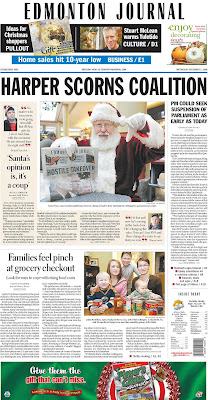Putting all of the pro- and anti-coalition rhetoric aside, I am sincerely hoping that the situation in Ottawa over the past two weeks spurns some serious national debate about parliamentary democracy in Canada, and more specifically, the separation of powers in our system of government.
Anyone who pays attention to Canadian politics (both federal and provincial) should have no problem recognizing the political authority held by the executive (cabinet) over the elected legislatures (MPs, MLA, etc). The ability of the Prime Minister to request the Governor General to prorogue Parliament raises some concerning questions about the power that the occupant of Prime Minister’s Office holds in our system of parliamentary democracy.
It’s not a radical concept that executive should govern at the behest of the elected legislature, not vice-versa, and the executive branch should never have the ability to shut down an entire house of elected representatives; this is undemocratic at the core. Though Prime Minister Stephen Harper was perfectly within his legal right to request the proroguement, this move highlights the critical flaws within our system and political culture that allowed and accepted this move.
Though the proroguing of Parliament will likely create short-term stability in Ottawa, Canadians should be concerned about the long-term repercussions of this move. By requesting the Governor General prorogue parliament, Harper was able to avoid facing an unfavourable vote by our elected representatives in the House of Commons. Will this clear the way for future Prime Ministers or Premiers to effectively shut down the elected legislatures when things aren’t going their way? Will it marginalize the already marginalized culture of independent thought and actions in the backbenches of our House of Commons?
This is only one of the ways in which the essence of our parliamentary system needs a complete overhaul, and creating clear separation of powers between the executive and legislative branches — allowing checks and balances that help keep each branch accountable — would be an excellent point to begin a national debate.
Last week, a friend (h/t A.A.) sent me an article on this topic from one of the key players in government today. Then President of the National Citizens’ Coalition Stephen Harper made a similar argument for government reform in a May 2001 article in the Alberta Report:
Anyway, the question is: how do we fix the system? Over the years we’ve proposed many solutions: free votes, direct democracy, Senate reform, and on and on. But since no one in Ottawa seems to be listening, Link asked me to come up with a new one.
So how about this: why haven’t any of the advocates of so-called “parliamentary reform” suggested that the essence of the parliamentary system itself needs to be fixed? By this I mean disconnecting the executive (cabinet) and legislative branches of government. Maybe what Canada needs is a system that separates the two branches of government along the lines of the American model,
To some, any such suggestion is an attack on Canada’s British tradition of parliamentary government. I believe they are mistaken. Indeed, in British history the legislative branch of government evolved as a separate and essential check on the unbridled power of the Crown. The original concept of executive “responsibility” to the legislature was not a complete fusing of the branches because, until at least the early part of the 20th century, the concept of an impotent Crown (if one defines this as not just the monarch, but her wider family and segment of society) was unthinkable.
Just as importantly, it was inconceivable to British voters that members of their legislature (let alone the cabinet) might one day become mere “voting machines” for a single first minister, a man deriving his power from an institution (the party) operating largely outside of Parliament.




